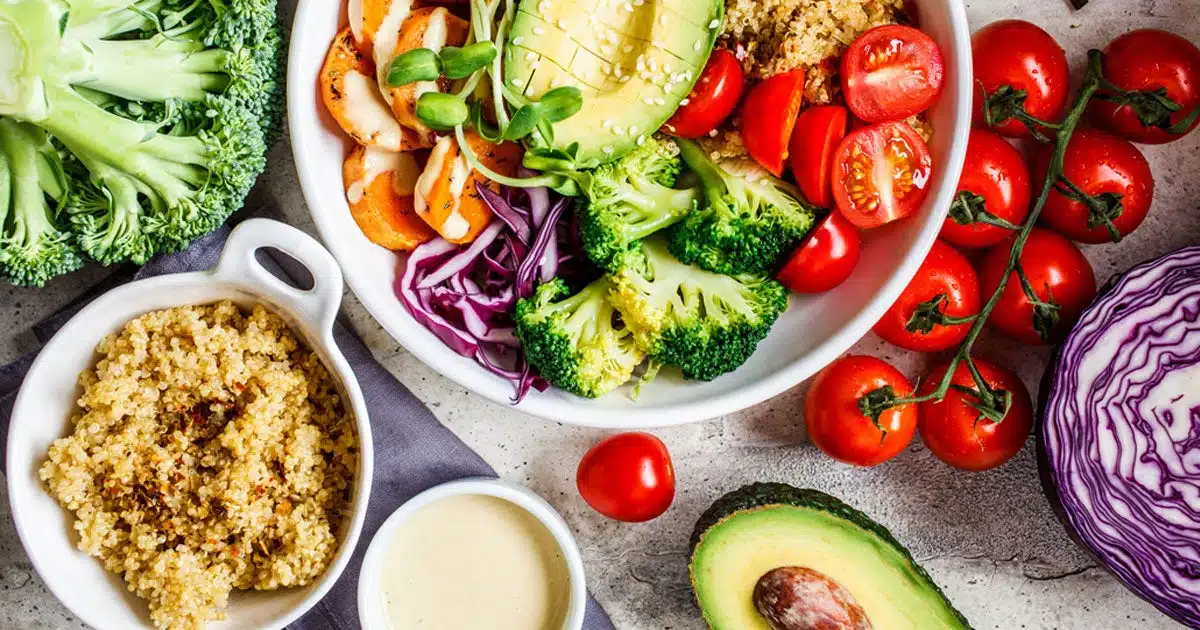Healthy Eating Tips : Keeping a healthy diet is key to your overall health. Up to 80% of early heart disease and stroke can be stopped by eating right and making good lifestyle choices. This article will give you tips to feed your body well, increase your energy, and live a balanced life with smart food choices.
Key Takeaways
- Eating a balanced diet is crucial for disease prevention and overall health
- Simple dietary changes can have a significant impact on energy, weight management, and well-being
- Focusing on fiber-rich carbohydrates, fruits, vegetables, and oily fish can provide essential nutrients
- Limiting saturated fats and added sugars can reduce the risk of chronic conditions
- Staying hydrated and consuming a nutritious breakfast are important for maintaining a healthy lifestyle
Balanced Diet Foundations
Keeping a healthy diet is key to feeling good overall. At the core is the idea of calorie balance. This means matching the calories you eat with the calories you burn. It’s vital for managing your weight and getting the right nutrition.
Understanding Calorie Balance
Your body needs a certain number of calories to work right and keep you going. If you eat more calories than you burn, you gain weight. Eating fewer calories than needed makes you lose weight by using fat for energy.
To keep a healthy calorie balance, watch your daily calorie intake and how much you burn. Pay attention to what you eat, how much, and how active you are. This helps make sure you have the right energy for your body.
Macronutrient Composition
The mix of macronutrients in your diet is also crucial for good health and nutrition. These include carbs, proteins, and fats, which give you energy and help with different body functions.
Getting the right mix of these nutrients is important for a balanced diet. Eating foods high in fiber, lean proteins, and healthy fats gives your body what it needs to stay healthy.
“Nourishing the body with the right balance of macronutrients is the foundation of a healthy, sustainable diet.”
Healthy Eating Tips

Eating a variety of nutrient-dense foods every day is key to a balanced life. Focus on fiber-rich carbs, fruits, vegetables, and oily fish. These foods are crucial for your health and happiness.
Focus on Fiber-Rich Carbohydrates
Choose whole-grain breads, cereals, and pastas for lots of fiber. These foods give you energy and keep you full, helping you avoid eating too much. Add quinoa, brown rice, and oats to your meals for a nutritious diet.
Prioritize Fruits and Vegetables
Fill half your plate with colorful fruits and vegetables for better health. They’re packed with vitamins, minerals, and antioxidants. These nutrients boost your immune system, keep your skin healthy, and lower disease risk. Eat a mix of leafy greens and berries for a wide range of nutrients.
Include Oily Fish
Add oily fish like salmon, trout, and sardines to your meals for omega-3 fatty acids. These fats are good for your heart, reduce inflammation, and might improve your brain function. Try to eat oily fish at least twice a week for the best health benefits.
By eating fiber-rich carbs, fruits, vegetables, and oily fish, you can make a healthy diet. These tips will help you feel great and keep you healthy.
| Nutrient-Dense Foods | Key Benefits |
|---|---|
| Whole Grains | Provide fiber, complex carbohydrates, and essential vitamins and minerals |
| Fruits and Vegetables | Rich in vitamins, minerals, antioxidants, and fiber to support overall health |
| Oily Fish | High in omega-3 fatty acids, which promote heart health and reduce inflammation |
“Eating a balanced, nutrient-rich diet is one of the most important things you can do to support your overall health and well-being.”
Limiting Unhealthy Choices

It’s key to eat healthy fats but cutting down on saturated fats is also important for your heart. These fats are in animal products and some processed foods. They can up your cholesterol and up your risk of heart disease. Also, eating less added sugar can prevent weight gain and other health problems.
Reducing Saturated Fat Intake
Here are ways to eat less saturated fat:
- Choose lean proteins like chicken, turkey, fish, and beans instead of fatty meats.
- Go for low-fat or non-fat dairy over full-fat ones.
- Stay away from fried and baked goods with hydrogenated oils or palm oil.
- Cook with healthy oils like olive, avocado, or sunflower oil instead of butter or lard.
Cutting Down on Added Sugars
Less added sugar is better for you. Here’s how to eat less sugar:
- Check nutrition labels and pick products with little or no added sugars.
- Drink fewer sugary drinks like soda, fruit juices, and sweet coffee or tea.
- Choose whole, fresh fruits over sugary snacks.
- Avoid processed and ultra-processed foods, which have lots of added sugars.
| Nutrient | Recommended Intake | Health Implications |
|---|---|---|
| Saturated Fat | Less than 10% of total daily calories | Increased risk of heart disease, high cholesterol levels |
| Added Sugars | Less than 10% of total daily calories | Weight gain, obesity, type 2 diabetes, and other chronic health conditions |
Making smart choices to eat less saturated fats and sugar helps your heart and prevents diseases.
“Reducing saturated fat and added sugar intake is a simple yet powerful way to support your overall well-being and reduce the risk of chronic diseases.”
Healthy Eating Tips
Starting a healthy lifestyle is all about eating right. Two key tips can boost your health: drink plenty of water and eat a nutritious breakfast.
Stay Hydrated
Drinking enough water is key for your body’s health, including your metabolism. It helps keep your energy up, aids digestion, and keeps your skin looking good. Try to drink at least eight 8-ounce glasses of water each day. Adjust this based on how active you are and your body’s needs.
Don’t Skip Breakfast
Eating a healthy breakfast gives you the energy and nutrients you need for the day. A balanced breakfast with carbs, protein, and healthy fats keeps your blood sugar stable, boosts your metabolism, and keeps you full. Good breakfast choices are oatmeal with berries, Greek yogurt with granola, or whole-grain toast with avocado and an egg.
Adding these healthy eating tips to your daily routine makes for a more energetic and nourished day. Drinking enough water and eating a nutritious breakfast are easy ways to live a balanced and healthy life.
| Hydration Benefits | Breakfast Benefits |
|---|---|
|
|
“Staying hydrated and eating a nutritious breakfast are simple yet powerful habits that can truly transform your overall health and well-being.”
Building a Nutritious Routine

Creating a consistent meal planning and meal preparation routine can change the game for your health. By planning and preparing meals ahead, you fuel your body right and save time. This approach ensures you get the nutrients you need while keeping your schedule manageable.
Meal Planning and Preparation
Start each week by planning your meals. This keeps you organized and lets you think about what your body needs. Include a mix of healthy proteins, complex carbs, and lots of fruits and vegetables in your meals.
Batch cooking is a great way to save time. Spend a few hours on the weekend cooking big batches of meals. This way, you always have nutritious food ready, making it easier to eat healthy during the week.
Choosing Healthy Cooking Methods
The way you cook can greatly affect your health. Choose baking, roasting, or steaming to keep nutrients in your food and avoid harmful compounds.
Avoid deep-frying or sautéing with too much oil. These methods add bad fats and calories. By picking healthy cooking methods, you can make tasty, nutritious meals that are good for you.
“Meal planning and preparation is the key to staying on track with a healthy lifestyle. It takes a bit of effort upfront, but the long-term benefits are well worth it.”
Also Read : Essential Tips For Maintaining Physical Health
Conclusion
Starting a healthy eating plan changes your life for the better. It makes you feel great and keeps you away from serious health issues. This article has given you the tools to make your body strong, boost your energy, and fight off diseases.
Eating a balanced diet is crucial for staying healthy. It should include lots of fiber-rich carbs, fruits, veggies, and healthy fats. Drinking plenty of water, eating breakfast every day, and planning your meals well also help. These steps lead to better physical and mental health.
Changing your eating habits is a step-by-step process. But, making small changes can bring big rewards. You’ll feel more alive, live longer, and enjoy a better life. Start using these healthy eating tips to move towards a balanced, vibrant, and disease-free future.
FAQs
Q: What are some essential tips for maintaining a healthy diet?
A: Essential tips for a healthy diet include eating a variety of foods from different food groups, focusing on fruits and vegetables, choosing whole grains, incorporating healthy fats, and cooking at home to control ingredients.
Q: How can I make healthy choices when grocery shopping?
A: To make healthy choices while grocery shopping, plan your meals ahead of time, create a shopping list that includes a variety of healthy foods, and avoid shopping while hungry to reduce impulse buys.
Q: What is the importance of eating a variety of foods in your diet?
A: Eating a variety of foods ensures that you get a balance of nutrients necessary for good health. It helps you consume essential vitamins, minerals, and other nutrients needed to maintain a healthy weight and overall well-being.
Q: How can I incorporate more healthy food into my meals?
A: You can incorporate more healthy food into your meals by adding vegetables and fruit to every dish, choosing lean cuts of meat or poultry, and substituting processed ingredients with whole foods.
Q: What role does the American Heart Association play in healthy eating?
A: The American Heart Association provides guidelines and resources for healthy eating, emphasizing the importance of a balanced diet rich in fruits, vegetables, whole grains, and healthy fats while reducing sugar and salt intake.
Q: What are some tips for healthy eating to maintain a healthy weight?
A: Tips for healthy eating to maintain a healthy weight include portion control, eating less processed food, choosing lower fat options, and ensuring that meals are balanced with a variety of healthy foods.
Q: How can cooking at home help in making healthier choices?
A: Cooking at home allows you to control the ingredients used, making it easier to limit unhealthy fats, sugars, and salts, and to include more nutritious foods in your meals.
Q: What types of healthy fats should I include in my diet?
A: Include unsaturated fats such as olive oil, avocados, and fatty fish in your diet, while limiting saturated fats and avoiding trans fats to promote heart health.
Q: How does drinking water contribute to eating well?
A: Drinking water is essential for overall health and can help you maintain a healthy weight by reducing the consumption of sugary drinks, aiding digestion, and keeping you hydrated.
Q: How can I improve my diet with healthier choices?
A: To improve your diet with healthier choices, focus on incorporating more whole, unprocessed foods, reducing intake of sugars and salts, and increasing your consumption of fruits, vegetables, and whole grains.





